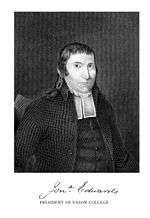Jonathan Edwards (the younger)


Jonathan Edwards (May 26, 1745 – August 1, 1801) was an American theologian and linguist.
Life and career
Born in Northampton, Massachusetts Bay, he was the second son of Jonathan Edwards, the elder. He graduated from Princeton in 1765, then studied theology under Joseph Bellamy, of Bethlehem, Connecticut. He was a tutor in Princeton (1767–69) and a pastor in New Haven, Connecticut (1769–95). After serving as pastor in Colebrook, Connecticut (1795–99), he went to Schenectady, New York, to serve as president of Union College.
Jonathan Edwards, the younger, died on 1 August 1801, and was buried in the churchyard of the First Presbyterian Church in Schenectady, New York.
Contribution to theology
As a theologian, his fame rests upon his reply to Charles Chauncy upon the salvation of all men, in which he defended the usual evangelical doctrine, his reply to Samuel West's Essays on Liberty and Necessity, in which he largely modified his father's theory of the will by giving it a liberal interpretation, and upon his sermons on the atonement. A great deal of religious controversy raged in New England during his lifetime. His works were published at Andover (1842), in two volumes, with a memoir by Tryon Edwards.
Unlike his father, who was a slave-owner, Jonathan Jr. supported abolition of the slave trade and of slavery. His anti-slavery viewpoint was first evidenced in 1773, when he wrote a series of articles entitled “Some Observations upon the Slavery of Negroes” in the Connecticut Journal and the New-Haven Post-Boy (Gamertsfelder, p. 137). These views were further articulated in his 1791 sermon, "The Injustice and Impolicy of the Slave trade".
Contribution to linguistics
Edwards was a pioneer in the historical linguistics of Native North America. He was raised in the community of Stockbridge, Massachusetts, where Indian speakers of the Mahican language were in the majority, and he was fluent in that language. He also acquired first-hand knowledge of other Algonquian and Iroquoian languages.
In 1787, Edwards published a study of the Mohegan language. In it, he presented evidence for the relatedness of Algonkian languages throughout northeastern North America and their distinctness from the neighboring Iroquoian languages. Edwards' work on New World linguistic classification paralleled that of his contemporary, William Jones, on the Indo-European languages.
References
- Campbell, Lyle. 1997. American Indian Languages: The Historical Linguistics of Native America. Oxford University Press.
- Edwards, Jonathan, Jr. 1787. Observations on the Language of the Muhhekaneew Indians, in Which the Extent of that Language in North America is Shewn, its Genius is Grammatically Traced, Some of its Peculiarities, and Some Instances of Analogy between that and the Hebrew are Pointed out. Josiah Meigs, New Haven, Connecticut.
- Edwards, Jonathan, Jr. 1842. The Works of Jonathan Edwards, with a Memoir of His Life and Character by Tryon Edwards. Allen, Morrill & Wardwell, Andover, Massachusetts.
- Gamertsfelder, Sarah. http://www.gilderlehrman.org/teachers/scholars/HSP03.EAA6.Gamertsfelder.pdf.
External links
- Jonathan Edwards Jr. listing at Find A Grave